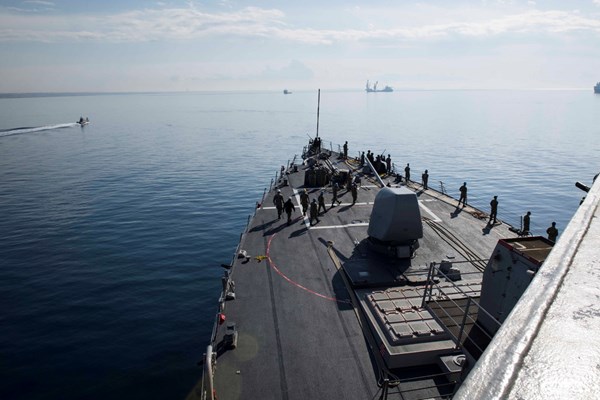Kremlin tells Washington to stay away from Crimea ‘for its own good’
Moscow views the U.S. sending its warships to the Black Sea amid the escalation in the Donbas as a "provocation" and warns that they should "stay away" from Russian shores, said the Russian Deputy Foreign Minister, Sergei Ryabkov.
According to him, Russia will continue to "protect the Russian-speaking population" in the Donbas, despite U.S. warnings that the resumption of hostilities in southeastern Ukraine will entail a "payback."
"Any threat only strengthens our conviction that we are on the right course," Interfax quoted Ryabkov as saying.
"They talk about the high price, but they never name it. What they have done so far, we have studied well, secondly, we have adapted," the deputy minister said, adding that he considers "unacceptable" terms like "payback."
The U.S., Ryabkov said, "is our adversary" and is "doing everything to undermine Russia's position on the international stage."
As for the American ships that will enter the Black Sea this week and stay there until May 4, they "have absolutely nothing to do near our shores," Ryabkov said.
"This is a purely provocative act. Provocative in the literal sense of the word: they test our strength, play with our nerves. They're not going to succeed," he said.
Maneuvers of the U.S. Fleet thousands of kilometers from their bases are always a tool of geopolitics, but the risks of certain incidents, according to Ryabkov, are "very high."
"We warn the United States that they should stay away from Crimea, from our Black Sea coast. It will be for their own good," the deputy minister said.
The U.S., in accordance with the Montreux Convention, notified Turkey that two U.S. Navy ships will cross through the Bosphorus and the Dardanelles into the Black Sea.
Two days later, Turkish President Recep Erdogan met with Ukrainian President Volodymyr Zelensky and promised to continue the strategic partnership with Kyiv, expand cooperation in the defense industry and support Ukraine’s plans to join NATO.
Erdogan also said it was Turkey’s "principled decision" not to recognize Russia's annexation of Crimea. A day later, Russian Federal Tourism Agency said it was suspending passenger flights to Turkey from April 15 to June 1, cancelling vacations for half a million Russians who bought tickets to Turkey, including for the May holidays.
